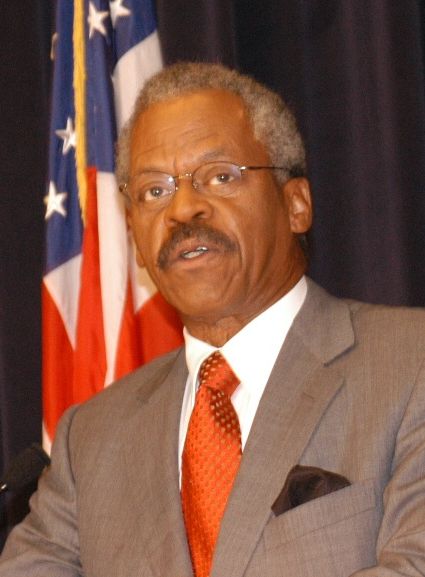Black Business News
Bernard Shaw: May 22,1940-September 7, 2022

Trailblazing News Anchor Inspired A Generation
of Black Journalists
By Marc H. Morial
President and CEO
National Urban League
“The qualities that made him our anchor – our rock: a manner and a voice that makes every word believable; the coolest demeanor in the hottest situations; the cut-to-the-quick interviewing style; and, at his core, a powerful combination of journalistic integrity and pure instinct.” – Judy Woodruff
***
Representation in media matters. It can shape not only how people perceive one another, but how people perceive themselves.
That’s why the remarkable career of television journalist Bernard Shaw, who passed away this week at the age of 82, was so significant. When the brand-new 24-hour cable news network CNN launched in June of 1980, America saw a Black man in the prime-time anchor chair. He was only the second Black anchor of a network evening news program; Max Robinson had been named co-anchor of ABC News’s World News Tonight in 1978 just two years earlier.
While Shaw’s award-winning career may have inspired an entire generation of young Black journalists, Shaw himself had no role models of color. But he knew what he wanted to be from the time he was a teenager growing up in Chicago.
CBS News correspondent Edward R. Murrow “was my idol,” Shaw said. “He was the kind of journalist, the kind of interviewer, the kind of anchorman I wanted to be.”
In 1961, when Walter Cronkite, also of CBS, arrived to report a story on Oahu where Shaw was stationed as a Marine, Shaw seized his chance.
“I called the hotel 34 times and left 34 messages,” Shaw said. He waited two hours for Cronkite in the hotel’s lobby.
“He was the most persistent guy I’ve ever met in my life,” Cronkite said. “I was going to give him five begrudging minutes and ended up talking to him for a half hour. He was just determined to be a journalist.”
Shaw downplayed the role of race in his career but said, “There were times when my color did play a role in perceptions, or people’s reactions to me.” He recalled a moment as a pool reporter covering a reception for President Lyndon Johnson at the “sumptuous ballroom” at the Plaza Hotel in New York. Among the guests were National Urban League President Whitney M. Young. “It was clear that this night had a very strong civil rights theme.” Just before making his entrance, President Johnson reached out to Shaw and touched him on the head and said, “It’s good to see you.”
“I know, as a human being, that he did that – one, because I was Black, and because of the emphasis that night,” Shaw said. “Just a small thing.”
His status as the only Black reporter in the room took a colder turn when President Richard Nixon unexpectedly announced his nomination of Clement Haynsworth, who had previously ruled to uphold racial segregation, to the Supreme Court.
“As the President was praising his nominee, professionally, my right hand was copying down every word. But my mind was thinking, ‘Clement Haynsworth? Supreme Court justice?’” And though Shaw was standing just a few feet away, “ The President never once looked at me. I know what was in the President’s mind – I could not prove it – but I knew it, instinctively.”
In addition to breaking racial barriers, Shaw played a key role in the transformation of CNN into a media powerhouse during the 1991 Gulf War. His riveting reporting from under a desk at the Al-Rashid Hotel in Baghdad, as cruise missiles flew past his window, defined both the coverage of the war, and Shaw’s personal courage and skill as a journalist.
It was Shaw who alerted CNN’s headquarters when the first bombs fell on Baghdad.
“He had the microphone first, the instinct to broadcast, to be there,” fellow CNN correspondent Peter Arnett said. “He didn’t hesitate. He scooped the world.”
Like his idols Murrow and Cronkite, Shaw brought some of the most consequential moments in history into America’s living rooms – the attempted assassination of President Ronald Regan in 1981, the 1989 demonstrations in China’s Tiananmen Square, the 1995 terrorist bombing in Oklahoma City. But when he retired in 2001, he expressed regret.
“Looking back over my career when I think about all the things that I did, but all the things that I missed within my family because I was out doing – I don’t think it was worth it,” he said.
His advice to the next generation was, “Pursue your dreams, but know that it will cost you.”
PHOTO: Courtesy